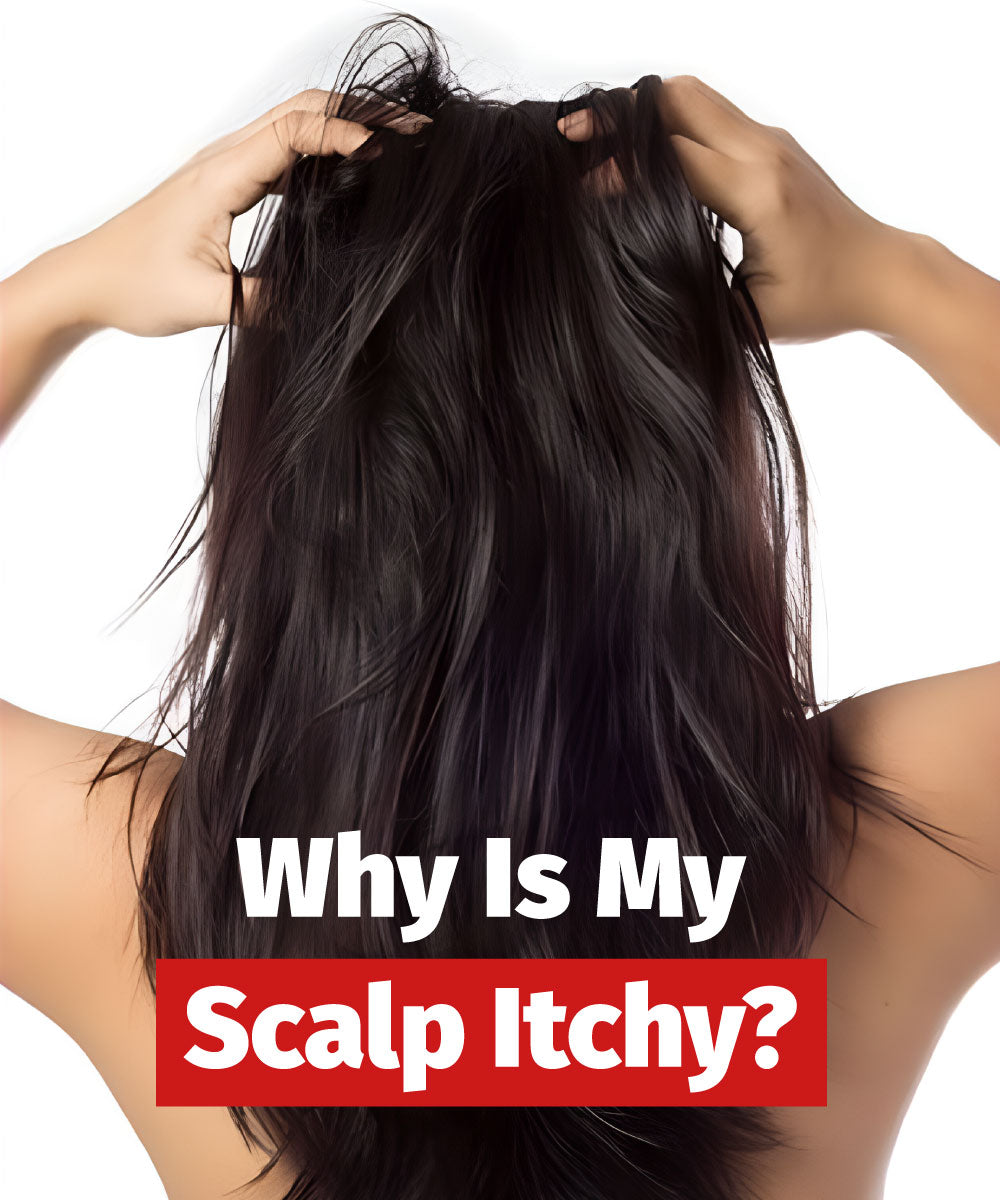Tired of constantly scratching your scalp? Occasional scratching is usually harmless, but frequent itchiness could be a sign of an itchy scalp, also known as scalp pruritus. It’s one of the most common scalp concerns. While dandruff is often the cause, several other factors, like dryness, product buildup, infections, or stress, can also trigger it.
An itchy scalp not only causes discomfort but can also lead to flakes, hair thinning, or even irritation if left untreated. Understanding ‘why is my scalp itchy’ helps you take the right steps to soothe it. In this blog, we’ll explore the causes, remedies, and simple ways to keep your scalp healthy and comfortable.
Common Causes of an Itchy Scalp & Solutions to Fix Them:
Understanding the root causes of an itchy scalp makes it easier to treat effectively and shows you how to reduce itchy scalp naturally.
1. Dandruff and Flaking:
One of the most common reasons for an itchy scalp is dandruff. It occurs when excess oil or yeast-like fungi develop, leading to flaky skin and irritation. Scratching only makes it worse.
Solution: Use a gentle dandruff-targeting cleanser like Herbal Shampoo (Dandruff Control) to reduce flakes, or pair it with Anti-Dandruff Hair Oil for soothing relief.
2. Product Buildup:
Residue from styling gels, sprays, or heavy conditioners can clog pores and leave your scalp feeling tight and itchy.
Solution: Opt for a clarifying yet nourishing wash, such as Goat Milk Shampoo to remove impurities while keeping the scalp balanced & nourished.
3. Dry Scalp:
Cold weather, frequent washing, or harsh shampoos can strip natural oils, leaving the scalp dry, itchy, and prone to flaking.
Solution: Restore hydration with Vilvah’s Hair Strengthening Combo, which deeply nourishes and improves your scalp health.
4. Allergic Reactions or Sensitivities:
Certain hair care products may contain ingredients that trigger irritation or itchiness.
Solution: Switch to gentle, natural hair care products, which care for the scalp without harsh chemicals.
5. Stress and Lifestyle Factors:
High stress, poor diet, dehydration, or lack of sleep can upset hormone balance, triggering scalp discomfort.
Solution: Alongside external treatments, adopting healthier habits helps your scalp recover faster and stay comfortable long term.
6. Combing and Exfoliation:
Sometimes, itchiness lingers because flakes and oils aren’t evenly distributed.
Solution: Use a Neem Wood Comb to help spread the scalp’s natural oils from root to tip, keeping your hair healthy, shiny, and less prone to dryness or flakes.
Daily scalp care tips:
Simple, consistent care makes a huge difference in managing how to treat itchy scalp effectively.
- Avoid scratching. Repeated scratching can worsen irritation and may damage hair follicles.
- Wash pillow covers and hair accessories regularly to prevent the buildup of bacteria and oil.
- Limit heat styling and harsh chemical treatments to reduce scalp stress.
- Gentle sun protection or covering hair in harsh sun helps prevent irritation.
- Massage your scalp regularly because scalp massage stimulates blood circulation, helps distribute natural oils evenly, and promotes a nourished, healthy scalp.
Myths v/s Facts About Itchy Scalp:
How much of what you hear about an itchy scalp is true? Let’s bust some common myths!
-
Myth: Scratching your scalp is harmless.
Fact: Frequent scratching can damage hair roots, worsen irritation, and lead to breakage. -
Myth: Only dandruff causes an itchy scalp.
Fact: Itchy scalp can also result from dryness, product buildup, allergies, or medical conditions, not just dandruff. -
Myth: Hair oils make scalp itch worse.
Fact: Not all hair oils worsen itchiness. Using the right oils, like Vilvah’s Hair Growth Oil or Anti-Dandruff Hair Oil, nourishes the scalp and helps reduce itchiness naturally.
“At Vilvah, we believe healthy hair starts with a healthy scalp. Our Herbal Shampoo (Dandruff Control) gently cleanses, reduces flakes, and soothes irritation without harsh chemicals. Every bottle combines tradition with science to keep your scalp nourished and comfortable. We made this shampoo for those who want care that’s effective, gentle, and truly kind to their hair and scalp.”
- Kruthika Kumaran, Founder, Vilvah
Simple lifestyle tips to prevent an itchy scalp:
Small, daily habits can help you understand how to prevent itchy scalp while keeping it nourished and comfortable.
- Follow a diet rich in vitamins, minerals, and antioxidants to support hair and scalp health.
- Stay hydrated and get adequate sleep to reduce scalp dryness and irritation.
- Manage stress through simple daily practices like stretching, walking, or meditation.
Healthy Scalp & Hair Starts Today!
An itchy scalp can happen for many reasons, but knowing the cause helps you treat it the right way. By combining gentle cleansing, nourishing treatments, healthy lifestyle habits, and a mindful hair care routine, you can soothe irritation, reduce flakes, and maintain a comfortable, healthy scalp.
Treat itchy scalp naturally with Vilvah’s Anti-Dandruff Hair Oil, Hair Growth Oil, Herbal Shampoo (Dandruff Control), and other carefully formulated hair care products. Explore the full hair care range online or at a store near you.
Frequently Asked Questions
1. Can itchy scalp cause hair loss?
Yes, constant scratching weakens hair roots and leads to breakage or hair fall. Treating the itch early keeps your scalp healthy and prevents long-term damage.
2. Why does my scalp feel itchy even after washing?
If your scalp itches after washing, your shampoo might be too harsh or leaving residue behind. Try a mild, sulfate-free hair cleanser and rinse thoroughly to calm irritation.
3. What causes itchy scalp in winter season?
Cold air and indoor heating strip moisture from the scalp, leading to dryness and flakes. Hydrating oils or a gentle scalp massage can bring back comfort and balance.
4. How to stop itchy scalp at night?
Apply a light, soothing scalp serum or oil before bed to reduce dryness. Keep your room humid and avoid tight hairstyles - both can worsen nighttime itching.
5. What are the common symptoms of an itchy scalp?
Common signs include dryness, flaking, redness, or a tight feeling on the scalp. Persistent itching may also cause hair breakage, so soothing care is key.


 Track Order
Track Order












Leave a comment
All comments are moderated before being published.
This site is protected by hCaptcha and the hCaptcha Privacy Policy and Terms of Service apply.